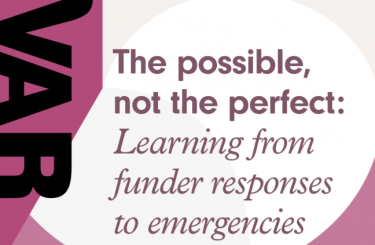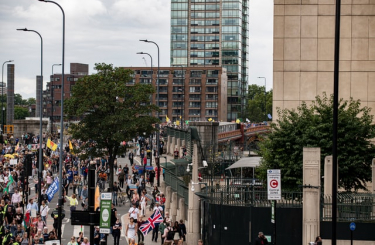Principles
At a time when so much is uncertain, having these trusting relationships to find out what’s happening in real time, and ensure funding can flow to where it’s most needed, has been critical.
What came through loud and clear to us in 2017 was that the effectiveness of the Grenfell funding response was based on it being straightforward, easy, quick and trusting. We’ve now taken that through into the London Community Response, with an agreed set of principles that include these key words, together with a focus on being intelligent, equitable, flexible and reflective.
Whilst it’s been a challenging time for everyone, we’ve had lots of support from across communities, civil society and funders to shape the collaborative funding programmes – as we did in the Grenfell funding response. At a time when so much is uncertain, having these trusting relationships to find out what’s happening in real time, and ensure funding can flow to where it’s most needed, has been critical. We’ve had reports, insights, case studies and more from people and communities across London that have shaped the needs assessment for the London Community Response – this has driven our funding priorities, but that we’ve also shared this intelligence with the wider funding community who are looking at what this means for funding beyond the crisis.
We’re now working with DataKind UK to analyse all the data from the application forms the London Community Response is receiving, as we know this is providing real-time insights into the needs of organisations and communities. We are working to ensure this is an open data set that can be used by others, so that we can share back to those we have learned so much from as we’ve worked together through this crisis.
Process
We knew that the same would happen as the covid-19 pandemic hit our communities – groups would respond, and we needed to ensure we stood with them in their work.
In North Kensington, we saw the importance of trusted, local groups from the voluntary, community and faith sectors responding quickly and effectively to urgent needs in their community. People whose first response was to help, to get things done, not to worry about how to fund their work. We knew that the same would happen as the covid-19 pandemic hit our communities – groups would respond, and we needed to ensure we stood with them in their work.
The learning from the Grenfell funding response has informed our process – the London Community Response has quickly moved to a single, simple application portal, built on the platform we developed in 2017, designed to ensure a straightforward connection between groups doing vital work and the many partner funders who want to help them to succeed. And we did this fast – lockdown was announced on the evening of Monday 23rd March and we received our first application on Friday 27th, with a commitment that funders would backdate funding to the start of the week where groups were already responding fast.
The lessons from Grenfell also tell us that decisions need to be quick so money gets to where it’s needed urgently – the shortest time between someone applying to the London Community Response and getting a grant decision has been two days, and we’re continuing to monitor how well we’re achieving the aim of being responsive to the needs of communities and civil society.
Practice
Clearly physical outreach has been impossible under the lockdown, but we have tried to apply this learning to our virtual approach so that equity is at the heart
Outreach was at the heart of funder practice in North Kensington after the fire – for the emergency programmes, grants managers going out into the community to meet with groups, understand their needs, and sit alongside them to craft an application. That helped ensure that funding flowed to the groups best-placed to respond, not just those who were already well-resourced – our data analysis[1] found that 55% of the grants (representing 58% of the money) went to groups who were BAME led, in contrast to the “business as usual” grantmaking experience highlighted by Voice4Change England.
Clearly physical outreach has been impossible under the lockdown, but we have tried to apply this learning to our virtual approach so that equity is at the heart – with support from infrastructure bodies across London, and more recently through developing a partnership where funding has been given to Ubele, the Council of Somali Organisations, London Gypsy and Travellers, Inclusion London, Consortium and the Women’s Resource Centre to support more targeted outreach and support to groups.
Our wave one grants for the London Community Response show around 30% of grants have been awarded to BAME-led groups, but we’re closely monitoring the equalities data on the application forms to ensure we’re reaching groups led by women, BAME, LGBT and Deaf and Disabled Londoners now and for the future.
Partnership
But the response is not just about funders working in partnership – it’s also been a partnership with civil society groups and communities
Collaboration, partnership and working together were key elements of the funding response after Grenfell – on 38 pages of text in The Possible Not The Perfect these words are mentioned 171 times – and the importance of this cooperative approach was key to our development of our response to the covid-19 pandemic. For the London Community Response, more than 50 funders from across sectors have contributed funding, and more than 100 have been part of the process design and delivery, intelligence sharing, and ensuring the funding response links to activities of local authorities and others who are focused on supporting communities.
But the response is not just about funders working in partnership – it’s also been a partnership with civil society groups and communities, whether the equity groups working alongside us as peers, or the infrastructure and delivery groups giving us insight and intelligence, or Londoners feeding in directly through surveys and online, none of this is possible without us all working together. We’ve also been feeding in what we know, and learning from the work of others, as part of London Strategic Coordination Group, where we’ve been able to help champion the work of funders and civil society as part of the crisis response and recovery planning. As The Possible Not The Perfect recommended, though, all of this isn’t just for a time of crisis – the good things we did then, the good things we’re doing now, should help us to change how we work beyond crisis to ensure that we’re working together so that our communities can thrive.
We’ll be sharing our learning from the London Community Response as we go, but are keen to hear from you too – let us know what you think of this blog, of the funding programmes we’re coordinating, or the opportunities to learn together for the future.
[1] Data was available on 82 out of 100 grant recipients of the community core costs fund


